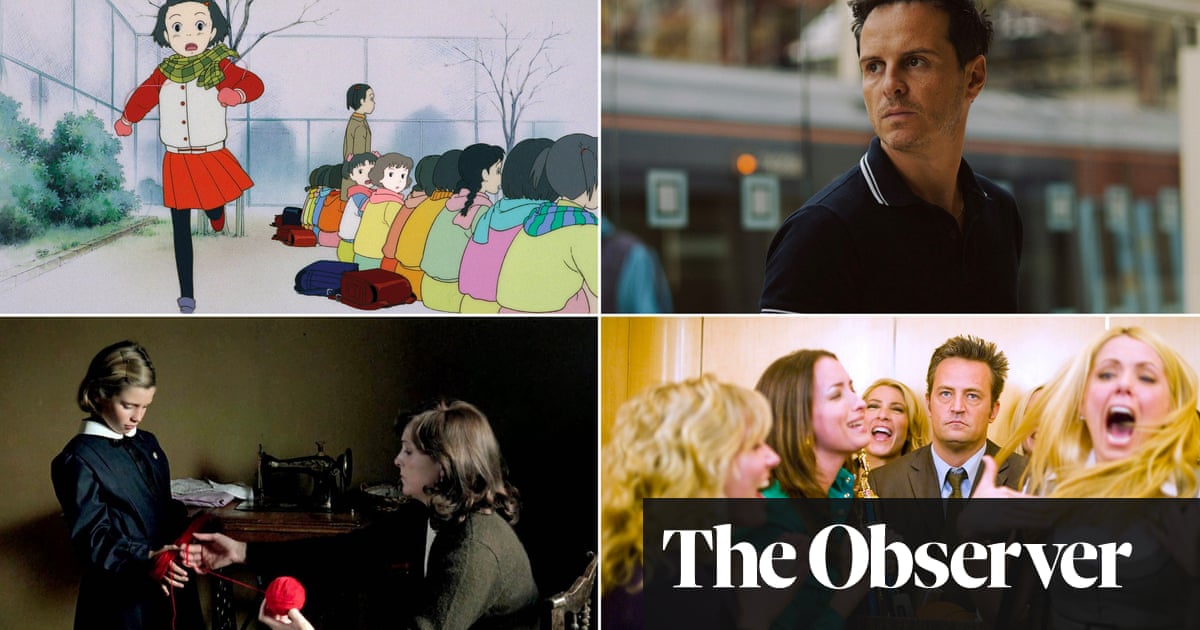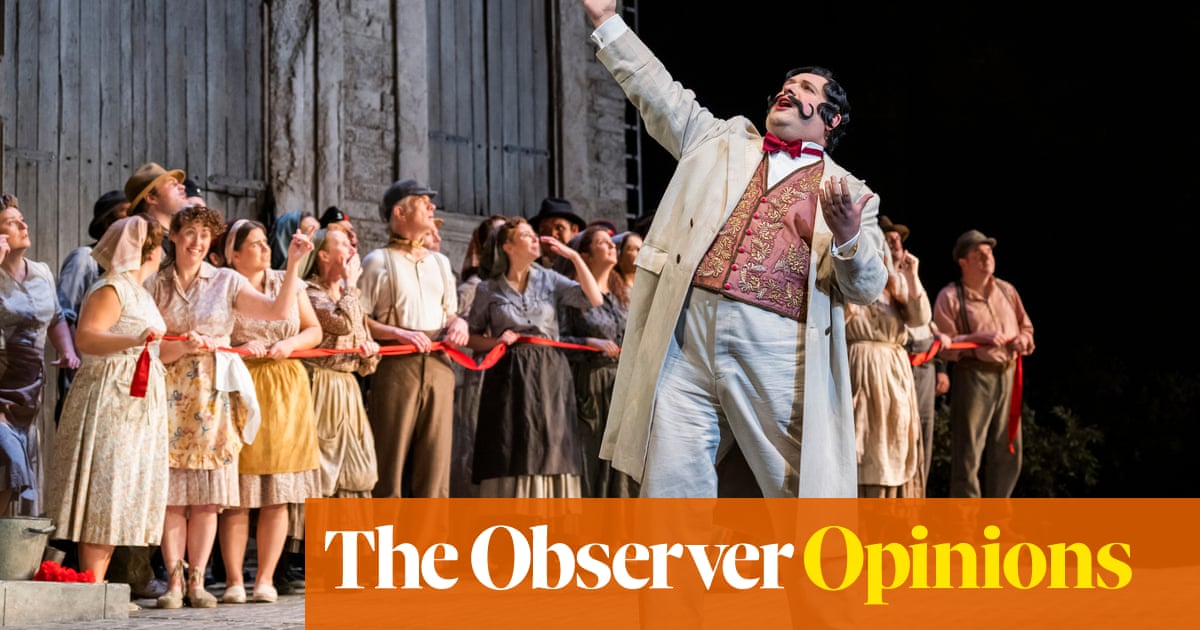
In Kyiv, daily performances at the National Opera of Ukraine are acts of brave defiance against the Russian invasion. They symbolise what the country is fighting for: life, culture. In Britain, untouched by war, we seem prepared to destroy our culture without outside help.
The news that English National Opera’s public funding has been removed is shocking, but not surprising. Early this year, the former culture secretary Nadine Dorries insisted that Arts Council England, the arts funding body, take £24m a year out of London. The idea was to redistribute it to places identified in the Tories’ levelling up agenda. The severity and abruptness of this cut to the capital, which was on an already threadbare English budget thanks to George Osborne’s austerity measures, was always likely to mean a disaster for one of the big London arts organisations.
ENO, seen from a certain perspective, is low-hanging fruit: it is the capital’s second opera house, with plenty of financial instability in its history, and takes a relatively large proportion of subsidy compared with its turnover. (ENO’s management would argue vigorously against this, saying that its financial model works, that it reaches audiences beyond its theatre through digital and broadcast, and that it has made huge strides in employing artists from diverse backgrounds and in attracting new young audiences.)
The company’s funding bid to ACE, when it was submitted earlier this year, did in fact respond to the levelling-up agenda. It suggested founding a small, nimble, offshoot company called NEO (an anagram of ENO, meaning new), which would take up residencies in theatres around the country. The ACE response, when the cuts were announced on 4 November, was to accept the idea of NEO, the satellite – while rejecting the planet, ENO. Financial aid was offered to the company to transition to this new (and of course, smaller) template. At the end of three years, the new organisation would be able to reapply for regular ACE funding. Manchester was floated – seemingly plucked from the air – as a potential base. ENO employs 300 people of world-class calibre, including an opera orchestra, a chorus and behind-the-scenes staff. On the basis of this idea, most of them would not be part of the new ENO, or NEO, wherever or whatever that may turn out to be.
To understand the significance of this, it’s worth looking at ENO’s origins. Its history reaches back to the prewar period, when the visionary impresario Lilian Baylis started mounting opera at Sadler’s Wells theatre in London. In 1968, the company moved to the London Coliseum, the largest theatre in the city. In 1977, Opera North was founded as its offshoot (soon becoming completely independent). Opera North, a superb company based in Leeds, performs regularly in Salford – one reason that the suggestion ENO moves to Manchester is so bizarre.
Some may ask whether London requires two opera houses. Others may wonder: why so few? Berlin has three, so does Paris. In fact the Royal Opera House and ENO have traditionally performed complementary roles. The Royal Opera is about international singers of global status. It offers a luxury experience (it is even sponsored by Rolex) with ticket prices, for the most part, to match. ENO has traditionally been rougher round the edges (though no less skilled and professional), with a more informal atmosphere and cheaper tickets. Generations of audiences have heard their first opera at the venue. It is there for everyone, and it is not an elitist playground (I think of Labour’s deputy leader Angela Rayner here, proudly photographed at an opera this summer, defiantly tweeting in the face of criticism from the deputy prime minister, Dominic Raab, of all people: “Never let anyone tell you you’re not good enough.”). Crucially for opera in this country, ENO has also offered a stage on which British opera singers, particularly at an early stage in their careers, have made their names. That’s why some of Britain’s greatest artists – Dame Sarah Connolly, Sir John Tomlinson – were on the streets this week, protesting against the cuts outside ACE’s headquarters, in full voice.
ACE was dealt an awful hand by the former culture secretary. It has now proceeded to play it terribly – unless it was actually seeking a furious campaign to rescue ENO. Instead of simply acknowledging the impossibility of the situation in which it was placed by Dorries, staff have attempted to justify its decision in terms that feel disingenuous. They point to a wave of smaller-scale, grassroots opera companies that present works in carparks, in pubs or “on your tablet”. This is the future of opera, they say. (“Grand opera” is a deeply misleading phrase, and feels like it is being deployed deliberately by ACE for its overtones of pretension and pomp. Grand opéra in fact refers to a specific subcategory of works, often on historical subjects, written in the early 19th century.) I have seen brilliant reduced productions of opera in non-traditional spaces – last year I saw a wonderful performance of Bluebeard’s Castle in a former chapel, for instance. As excellent as it was, though, it was not the work as Bartók, its composer, conceived it. That would have required the scale and heft of a full orchestra, in an opera house. Which wouldn’t make it a mysterious, remote, outmoded thing called grand opera. It’s what we call … opera.
In fact it is opera – that remarkable, pulsating, intense, emotionally overwhelming art form – that is, perversely, in danger of being overlooked. As are the artists who make it: composers, directors, conductors, musicians, singers. ACE cannot and should not dictate what the future of an art form might be. That is for its creators. ENO itself, in its eagerness to champion its audience development efforts and to speak about initiatives such as ENO Breathe (a pioneering project helping those recovering from Covid-19), can also sometimes skip over the claims of the profound, weird, unsettling art form itself. That slight sense of absence has not been helped by the questionable decision in recent years to reduce opera performances, weakening the core of the company.
Amid all this, there has been good news for arts organisations in levelling-up target areas in Blackpool, in Stoke, in the east Midlands and elsewhere. It is wonderful news that money is reaching artist-led companies such Claybody Theatre and Restoke in the Potteries, where I come from. But the bitter truth is that this is a zero-sum game. There was no extra money for this “rebalancing”. The blow to ENO is likely to result in people losing their jobs, misery for families, the blatant waste of extraordinary skills, a major loss for audiences and a gaping void where once a great company nurtured generations of talented young British singers.
Meaningful levelling up of economic conditions in England could be achieved – but only through serious infrastructural investment into, for instance, rail links and public transport. What is happening here is purely gestural, and deeply destructive.
Charlotte Higgins is the Guardian’s chief culture writer












